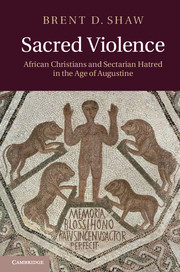Book contents
- Frontmatter
- Contents
- Abbreviations
- Maps
- Acknowledgments
- Introduction
- Chapter 1 This terrible custom
- Chapter 2 Church of the traitors
- Chapter 3 A poisonous brood of vipers
- Chapter 4 Archives of memory
- Chapter 5 The city of denial
- Chapter 6 Ravens feeding on death
- Chapter 7 Little foxes, evil women
- Chapter 8 Guardians of the people
- Chapter 9 In the house of discipline
- Chapter 10 Sing a new song
- Chapter 11 Kings of this world
- Chapter 12 We choose to stand
- Chapter 13 Athletes of death
- Chapter 14 Bad boys
- Chapter 15 Men of blood
- Chapter 16 Divine winds
- Chapter 17 So what?
- Appendix A Bishops and bishoprics in Africa: the numbers
- Appendix B Origins of the division: chronology
- Appendix C The Catholic conference of 348
- Appendix D The Edict of Unity and the Persecution of 347
- Appendix E The mission of Paul and Macarius
- Appendix F Historical fictions: interpreting the circumcellions
- Appendix G The archaeology of suicide
- Appendix H African sermons
- Bibliography
- Index
- References
Chapter 1 - This terrible custom
Published online by Cambridge University Press: 07 September 2011
- Frontmatter
- Contents
- Abbreviations
- Maps
- Acknowledgments
- Introduction
- Chapter 1 This terrible custom
- Chapter 2 Church of the traitors
- Chapter 3 A poisonous brood of vipers
- Chapter 4 Archives of memory
- Chapter 5 The city of denial
- Chapter 6 Ravens feeding on death
- Chapter 7 Little foxes, evil women
- Chapter 8 Guardians of the people
- Chapter 9 In the house of discipline
- Chapter 10 Sing a new song
- Chapter 11 Kings of this world
- Chapter 12 We choose to stand
- Chapter 13 Athletes of death
- Chapter 14 Bad boys
- Chapter 15 Men of blood
- Chapter 16 Divine winds
- Chapter 17 So what?
- Appendix A Bishops and bishoprics in Africa: the numbers
- Appendix B Origins of the division: chronology
- Appendix C The Catholic conference of 348
- Appendix D The Edict of Unity and the Persecution of 347
- Appendix E The mission of Paul and Macarius
- Appendix F Historical fictions: interpreting the circumcellions
- Appendix G The archaeology of suicide
- Appendix H African sermons
- Bibliography
- Index
- References
Summary
Under the burning midsummer sun of the year 418, Augustine, the Catholic bishop of Hippo Regius, already in his mid-sixties and increasingly burdened with the ailments of old age, undertook a journey of unusual length and direction. The long trek took him well outside the heartlands of Africa with which he was familiar. He travelled the roads to Caesarea, the capital of the imperial province of Mauretania Caesariensis, well over 350 miles to the west. Given the deliberate pace of an average day's travel on mule or horseback, the journey would have taken him and his companions about two weeks to complete. What is more, Augustine suffered badly from hemorrhoids and anal fistulae, afflictions that would have made the ride all the more painful. Quite apart from the arduous nature of the trek, the people who lived in Augustine's part of Africa thought of Caesariensis, the far western province of Rome's African empire, as a barbaric and dangerous frontier land. To them, its hinterland did not really belong to the civilized regions of the east. The people of Mauretania knew that they were different; some of them did not even wish to be called “Africans.” As he made his way through Mauretania Sitifensis, the province just to the east of Caesariensis, Augustine already felt that he was on the frontier next to “the land of the barbarians.” The forbidding mountains of Caesariensis, immediately to the west, harboured “innumerable barbarian peoples” to whom the Christian message had not yet been preached. Anyone could see as much by observing its “barbaric” inhabitants who were hunted down, men and women who were transported to the cities of the coast to feed the imperial slave trade.
The reasons why Augustine made this arduous journey have been much debated, but the mission was sufficiently urgent to require the presence of the most prestigious bishop of the Catholic Church in Africa, and it was undertaken at the request of Zosimus, the bishop of Rome. Augustine took with him two of his most-trusted fellow-bishops, Alypius of Thagaste and Possidius of Calama. All three were acting as legates sent on a mission by the Church of Rome. But they also had an agenda of their own. As one of the most talented, energetic, and committed leaders of the Catholic Church in Africa, Augustine decided to take advantage of his presence in Caesarea – which he reached by mid-September – to confront Emeritus, bishop of the dissident or “Donatist” Christian community in the city, and to do this in the basilica that had once been Emeritus’ own church. Only a few years earlier, the basilica had been seized by the Catholics under the authority of decrees issued by the emperor that had ordered dissident bishops, like Emeritus, to hand over their places of worship to the state-approved Catholic Church. State coercion had transformed Emeritus’ basilica into a Catholic place of worship. To drive home who was now in power, Augustine delivered a long sermon to the local congregation on the evils of his sectarian enemies in the very basilica that had once belonged to them. He expatiated on the good of the unity imposed on all Christians by imperial laws that had made “the Donatists” an illegal heretical sect and had forced them to return to the Catholic fold.
- Type
- Chapter
- Information
- Sacred ViolenceAfrican Christians and Sectarian Hatred in the Age of Augustine, pp. 10 - 65Publisher: Cambridge University PressPrint publication year: 2011



